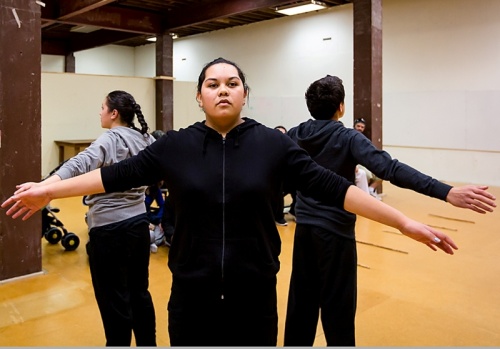Te Rau O Te Rangi
TKKM o Porirua, Te Rau O Te Rangi
27/08/2012 - 27/08/2012
kura, Marae, colleges, Wananga, kohanga or local communities, New Zealand wide
23/07/2012 - 09/09/2012
Te Papa Tongarewa, Te Marae, Cable Street, Wellington
11/03/2013 - 16/03/2013
Capital E National Arts Festival
Production Details
The context of Te Reo Māori by its metaphorical nature insists that the role of relationship and tikanga take precedence over how encounters happen. How can Te Reo Māori guide how we exchange with community? How can we use Te Reo Māori to inform how we make theatre? How can we use Te Reo Māori to find a stronger purpose behind our creative process?
Taki Rua honors these questions by:
- building upon its 16-year history of touring work to tamariki throughout New Zealand;
- acknowledging existing and new relationships across New Zealand’s diverse communities;
- providing opportunities for these audiences to access the theatrical arts where they might not usually be able to do so;
- striving to maintain quality exposure and awareness of Te Reo Māori and tikanga, and
- promoting Te Reo Māori both as a spoken language and a framework for creating our works.
These are the drivers behind Taki Rua Production’s 2012 Te Reo Māori Season – Te Rau O Te Rangi.
This year’s work is an original piece, created through a developing methodology and based on processes of tikanga, a deepening relationship to Pakiwaitara (Māori forms of storytelling), Atuatanga (relationship to natural elements) and Inoi (recognising the elements as part of our inner and external selves).
The narrative of the show follows Kahe’s intimate journey and sacrifice in order to save her people. Heeding the warning from a prophetic dream signalling an invading force from the south planning to attack her Kapiti Island homeland (rich of native wildlife), she prepares for her only choice: to take her baby and swim across one of New Zealand’s swiftest channels towards the safety of the mainland.
To tell a story is one thing, to perform it, is another. The performance heads into the realm of metaphor and the performers must commit to an investigation of their own sense of self in order to share an experience with an audience rather than simply delivering facts.
National tour dates 23rd July – 9th September
To book this performance for your kura, Marae, college, Wananga, kohanga or local community please email tereotour@takirua.co.nz :
Northland
23rd – 27th July
Auckland
30th July – 3rd August
Waikato
6th – 10th August
Bay of Plenty
13th – 17th August
Gisborne
20th – 22nd August
Hawkes Bay
23 – 24 August
Manawatu
25 – 26 August
Wellington
27th – 31st August
Canterbury / Southland
3rd – 8th September
Please contact Aneta Ruth, Tour Co-ordinator, at tereotour@takirua.co.nz if you are interested in seeing this work.
2013
CAPITAL E NATIONAL ARTS FESTIVAL
Education Dates:Mon 11 – Fri 15 March
Public Show:10.15am Sat 16 March (FREE! made possible by the generosity of Te Papa).
Venue: Te Papa Te Marae
Age: 7 – 14 years
Duration: 45 minutes
Performers: Amanda Noblett, Raiha Moetara, Puriri Koria
Set & Costume Designer: Alice Hill
Sound Designer: Maaka McGregor
The love, the hardship, the journey
Review by Moana Ete 11th Mar 2013
It’s an important thing, I feel, to be powhiri’d onto a theatre space. I so often tumble into a show as if by moving train – I forget to look forward to what I’m about to see. To wait at the entrance with 150 or so children to be welcomed onto the Marae is an opportunity for me to prepare myself physically and spiritually for what I am about to experience.
All-encompassing Amanda Knoblett, our designated Kaikaranga and show narrator, meets us at the entrance. She coos us into the world of Te Rau o te Rangi with lyrical tones, leading us toward Rongomaraeroa, Te Papa’s Iconic Marae. Yonder is mighty Puriri Koria, performing a taiaha set.
We arrive at the Marae where the powhiri continues. Raiha Moetara’s uplifting karanga matches Rongomaraeroa’s glory note for note. With the closing of the powhiri comes the opening of this show. We are underway with beautiful waiata* created by this trusty trio.
The story of Kahe Te Rau O te Rangi is a told through a balance of traditional Maori forms (Waiata-a-ringa, Moteatea and Haka**) and traditional theatre conventions (transformation, puppetry, dance).
I am most impressed with our fresh-faced performers captivating me along with its young audience. Puriri’s youthful energy is palpable. He is an acutely focused performer. Whether it is thrashing his taiaha with a pin-sharp precision, or handling the baby puppet with such tenderness, this youngster’s performative sensibilities exceed his fourteen years. He is a must-see of this festival.
Amanda’s natural charm and cheek translates so beautifully onto stage. She morphs easily into different characters; I see her truly indulge in each one, making her a joy to watch. Amanda is the perfect tuakana for young Raiha who seems to have a lifetime of performing both behind and ahead of her. Strongly rooted in Kapa Haka, this girl’s vocal prowess resonates deep in the soul.
A self-confessed novice at the Maori language, most of the particulars of the story was lost on me. There was a mother, there was a child and there was swimming. And that’s the extent of my understanding if I’m honest with myself. But this does not take away from the essence of this story.
The love, the hardship, the journey.
*song
**action song, ancient chant and war dance
Copyright © in the review belongs to the reviewer





Comments